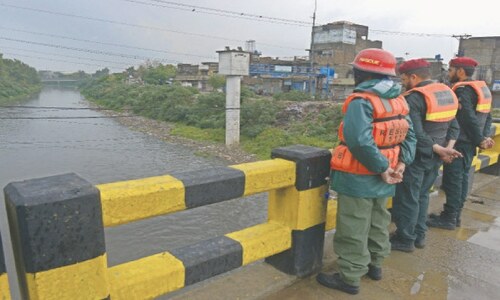ISLAMABAD: During a discussion on Pakistan’s Agenda for Economic Reforms, a book that aims to provide a non-technical explanation for Pakistan’s poor economic growth and the performance of the public sector, the author said the China Pakistan Economic Corridor (CPEC) had given a new narrative to Pakistan’s economy and a boost of confidence to private sector investors.
The book’s author, Vaqar Ahmed, was speaking at a discussion on his book organised by the Oxford University Press and hosted by Fasi Zaka.
Mr Ahmed is the deputy executive director at the Sustainable Development Policy Institute. His book argues for reforms in institutions dealing with economic policy regulation and management and identifies areas of improvement and structural reforms that the economy could pursue for inclusive growth and social justice.
Author of book on Pakistan’s economy discusses need for institutional reform
The book contains seven chapters that cover issues such as tax policy and administration, export competitiveness, public expenditure management, macroeconomic policy governance, economic corridors and job creation.
Mr Zaka, the host, carried an interesting conversation with the author during which they discussed various current economic matters, such as CPEC and a recent amnesty scheme.
Discussing CPEC, Mr Ahmed said CPEC has given the economy a new narrative due to the revamping of road, energy and port infrastructure. However, he said that the political economy of international relations would need to be reformed to make CPEC more fruitful, and Pakistan will have to resolve its conflicts with its neighbours.
“A lack of regional economic connectivity has a very negative impact on the overall growth and trade prospect,” he said.
In response to a question, Mr Ahmed said the recent amnesty scheme disfavoured rightful taxpayers.
He argued that the percentage of tax was very low, which would not serve the scheme’s purpose.
“If we talk about the reality, the government is facing a huge financial gap and doesn’t want to go to the IMF before the elections as this could be political suicide for them. They are following the example of Argentina, who collected $110 billion through same scheme, but there was high tax rate,” he explained.
He said the government wanted to favour a particular segment, but this would be in vain just like previous amnesty schemes.
Discussing institutional reform, Mr Ahmed said the process of reform at institutions was painfully slow. He added that parliamentary committees could expedite this process, but the level of understanding among provincial parliamentarians needed to increase.
The autonomy of the Federal Board of Revenue and the State Bank, which he said were under political influence and used as tools in the budget to show favourable figures and sanction loans for favoured individuals, was emphasised. Mr Ahmed added: “Unfortunately, the State Bank has no role in deciding the credit plan for the country.”
He explained that he decided to write his book in light of his experiences working in government and private economic institutions, for people who did not understand the complex data economy for generating social accountability of economic reform.
He added that there was no data available on human resource development for social science researchers. He said all the provinces have their own boards of revenue, and in the absence of a statistical system, they had started competing with FBR data.
In his concluding notes, Mr Ahmed said everybodu should think about the kind of economy and the role of economic institutions they want. He added that in the absence of regional connectivity, the dream of making Pakistan economically vibrant cannot come true.
Published in Dawn, May 4th, 2018















































Dear visitor, the comments section is undergoing an overhaul and will return soon.